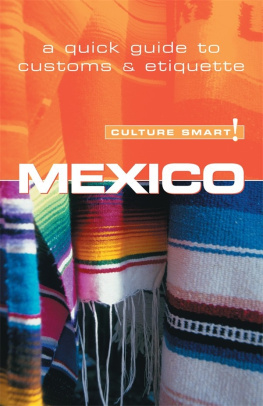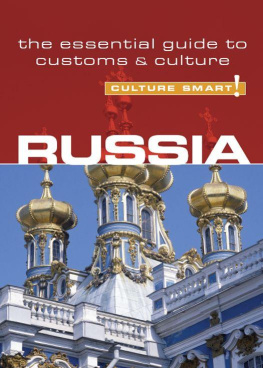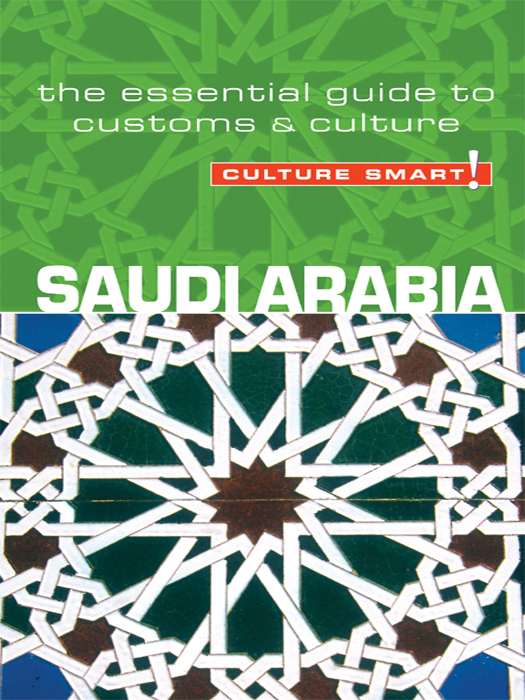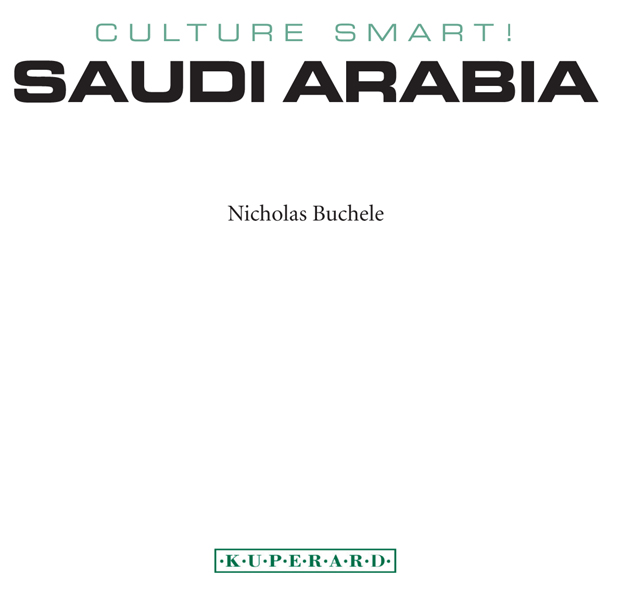eISBN: 978-1-85733-591-0
British Library Cataloguing in Publication Data
A CIP catalogue entry for this book is available from the British Library
Copyright 2008 Kuperard
Third printing 2010
All rights reserved. No part of this publication may be reprinted or reproduced, stored in a retrieval system, or transmitted in any form or by any means without prior permission in writing from the publishers.
Culture Smart! is a registered trademark of Bravo Ltd
First published in Great Britain 2008
by Kuperard, an imprint of Bravo Ltd
59 Hutton Grove, London N12 8DS
Tel: +44 (0) 20 8446 2440 Fax: +44 (0) 20 8446 2441
www.culturesmart.co.uk
Inquiries:
Series Editor Geoffrey Chesler
Cover image: Tile pattern, Abdul Raouf Hasan Khalil Museum, Jeddah.
Travel Ink/Stephen Coyne
Images on Ali Mansuri
v3.1
About the Author
NICOLAS BUCHELE grew up in Hamburg and was educated at University College London, where he graduated with first-class honors in English Language and Literature. He left Europe in 1997 to work as a journalist in Asia. In 200304, he was chief sub-editor at Arab News in Jeddah, Saudi Arabia. He has published articles on subjects ranging from Henry James late novels to car launches in Lebanon. He now lives in Bangkok, Thailand, where he works for Koreas largest-circulation newspaper, the Chosun Ilbo.
The Culture Smart! series is continuing to expand.
For further information and latest titles visit
www.culturesmartguides.com
The publishers would like to thank CultureSmart!Consulting for its help in researching and developing the concept for this series.
CultureSmart!Consulting creates tailor-made seminars and consultancy programs to meet a wide range of corporate, public-sector, and individual needs. Whether delivering courses on multicultural team building in the USA, preparing Chinese engineers for a posting in Europe, training call-center staff in India, or raising the awareness of police forces to the needs of diverse ethnic communities, it provides essential, practical, and powerful skills worldwide to an increasingly international workforce.
For details, visit www.culturesmartconsulting.com
CultureSmart!Consulting and CultureSmart! guides have both contributed to and featured regularly in the weekly travel program Fast Track on BBC World TV.
contents
Map of Saudi Arabia
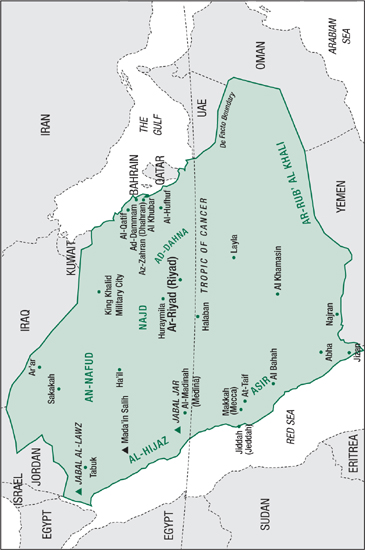
introduction
There is no such thing as society, Margaret Thatcher famously said. There are individual men and women and there are families. As nonsensical as this might have been in the context of Britain, it is true of Saudi Arabiaperhaps with the added proviso, There are tribes.
It would be hard to think of another nation of 22 million so singularly free of the myriad social interconnections Westerners take for granted: neighborliness; public space; debate about the ephemera of pop culture, the pretensions of high culture, and the political issues of the day; and a media representing the full spectrum of opinion.
Yet to the outside world at least, the Kingdom of Saudi Arabia presents a uniform appearance: the traditional robes of the men and the black overgarments and veils of the women, at first glance, make the former difficult and the latter sometimes impossible to distinguish from one another; and the official religion pervading every aspect of peoples lives can make it seem as if all Saudis have everything in common.
That is only the greatest of the paradoxes of Saudi Arabia, a country where stark opposites coexist without ever resolving themselves into a synthesis. This people, wrote T. E. Lawrence of the Arabs he lived among, was black and white, not only in vision, but by inmost furnishing; black and white not merely in clarity, but in apposition. Their thoughts were at ease only in extremes. They inhabited superlatives by choice.
Divided by region, creed, and background but united in Islam, insular yet forever traveling abroad, and living with a foreign contingent that makes up nearly one-fifth of the population: the list goes on. So what do Saudis have in common beyond their national dress? Perhaps the key characteristic is that Saudis are intensely private people. Getting to know them can be a challengetheir reticence is often masked by loud voices and what can seem an arrogant attitudebut it is a challenge worth taking up. Those who make the effort will encounter charismatic people capable of enormous charm, with great storytelling verve, and a sharp sense of humor that thrives on exaggeration. They will also encounter enormously gracious hosts.
In his own home or company, every Saudi is king. Many Saudi men have a regal demeanor, reflecting the unchallenged supremacy they enjoy within their own realm. Perhaps that is why they need to claim as much separate space as possible.
Saudi Arabia is a young nation. People under twenty-five make up as much as two-thirds of the population, and Riyadh will be the peninsulas first megacity by about 2020. For anyone interested in how a society in transition adjusts, by trial and frequent error, to new realities, it is a fascinating place to visit.
Key Facts
| Official Name | Kingdom of Saudi Arabia (Al-Mamlaka al-Arabiya as-Saudiya) | Member of Arab League and Gulf Cooperation Council |
| Capital City | Riyadh |
| Main Cities | Jeddah, Dammam, al-Khobar |
| Population | 27,601,038 (2007 est.), of whom 5.6 m are foreigners | Annual population growth rate 2.06% |
| Ethnic Makeup | Arab 90%, Afro-Asian 10% |
| Age Structure | 014 years: 38.2% 1564 years: 59.4% 65 years and over: 2.4% |
| Area | 864,869 square miles (2,240,000 sq. km) |
| Geography | Middle East, bordering the Persian Gulf and the Red Sea, north of Yemen | Four regions: Hijaz, Najd, Eastern Province, South |
| Terrain | Mostly sandy desert. Rugged mountains along the west coast give way to a central plateau; the east is rocky or sandy lowland. The huge sandy desert to the south is hostile to life. |
| Climate | Desert climate, with hot days and cold nights; hot and humid on the coast |
| Natural Resources | Petroleum, natural gas, iron ore, gold, copper |
| Currency | Saudi riyal (SAR) US $1 = SAR 3.75 |
| Language | Arabic | English is widely understood. The labor communities have their own languages. |
| Religion | Sunni Islam, Wahhabi | The religious establishment, the ulema, is headed by the Grand Mufti. |
| Minority Faiths | Shia Islam; Christianity and Hinduism among expatriates |


